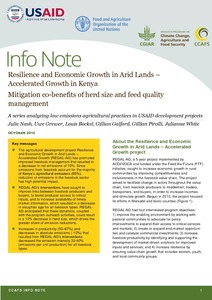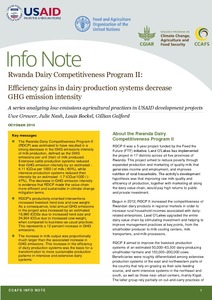Focal point
Location
The Food and Agriculture Organization of the United Nations leads international efforts to defeat hunger. Serving both developed and developing countries, FAO acts as a neutral forum where all nations meet as equals to negotiate agreements and debate policy. FAO is also a source of knowledge and information. We help developing countries and countries in transition modernize and improve agriculture, forestry and fisheries practices and ensure good nutrition for all. Since our founding in 1945, we have focused special attention on developing rural areas, home to 70 percent of the world's poor and hungry people.
Members:
Resources
Displaying 1146 - 1150 of 5074Review of the Programme of Work on Climate Change and Genetic Resources for Food and Agriculture
Meeting Name: Commission on Genetic Resources for Food and Agriculture (CGRFA)
Meeting symbol/code: CGRFA-16/17/8
Session: Sess.16
2015 Global Forest Products Facts and Figures
This note presents highlights and recent trends in data for each of the main product groups, as well as a short summary of recent changes or improvements in statistics.
La mujer y los recursos de agua
La demanda de agua registra un rápido aumento en todo el mundo y el costo de desarrollar nuevos suministros resulta prohibitivo en muchos países. Paralelamente, la creciente contaminación del agua agrava el ya existente desequilibrio entre demanda y suministro. De ahí la vital importancia de desarrollar los recursos agua y riego en el marco de los esfuerzos por mejorar la seguridad alimentaria y la producción agrícola sostenible.
Resilience and Economic Growth in Arid Lands - Accelerated Growth in Kenya: Mitigation co-benefits of herd size and feed quality management
The agricultural development project Resilience and Economic Growth in Arid Lands – Accelerated Growth (REGAL-AG) has promoted improved livestock management that resulted in a decrease in net emissions of 10%. Since emissions from livestock account for the majority of Kenya’s agricultural emissions (95%), reduction of emissions in the livestock sector has high potential impact.
Rwanda Dairy Competitiveness Program II: Efficiency gains in dairy production systems decrease GHG emission intensity
? The Rwanda Dairy Competitiveness Program II
(RDCP) was estimated to have resulted in a
strong decrease in the GHG emissions intensity
of milk production, defined as the GHG
emissions per unit (liter) of milk produced.
Extensive cattle production systems reduced
their GHG emission intensity by an estimated -
4.11 tCO2e per 1000 l of milk (-60%), while
intensive production systems reduced their
intensity by an estimated -1.7 tCO2e/1000 l (-
47%). The decrease in GHG emission intensity









